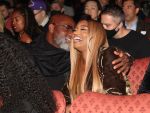“Race remains a deep fault line in America. Millions of people of color still experience racism in their everyday lives.” – Hillary Clinton
Hillary Clinton is distinguishing herself from the field of nearly 20 Republican presidential candidates by embracing African-Americans voters and boldly discussing a prickly subject her GOP opponents refuse to discuss: race.
While most of the GOP candidates have declined to mention race in any substantive way, Clinton has met with Black voters and used her campaign speeches to support critical issues that impact black voters.
On Saturday, Clinton spoke out about the murders in Charleston, South Carolina where Dylann Roof, a white supremacist, gunned down nine black parishioners who were gathered inside Emanuel AME Church for an evening prayer service last week.
“Once again, racist rhetoric has metastasized into racist violence,” Clinton said Saturday while addressing a summit of the U.S. Conference of Mayors in San Francisco.
“Now, it’s tempting, it is tempting to dismiss a tragedy like this as an isolated incident, to believe that in today’s America, bigotry is largely behind us, that institutionalized racism no longer exists,” Clinton said, in perhaps her most candid speech on race. “But despite our best efforts and our highest hopes, America’s long struggle with race is far from finished.”
Clinton’s remarks about the Charleston shootings underscores her commitment to reaching out to African Americans 17 months before voters head to the polls to elect the nation’s next president.
While many African-American voters complain that most presidential candidates wait until the final months – even weeks – of the campaign to reach out to Black voters, Clinton is already engaging them and hiring a notable team of African American advisors at all levels of her campaign.
“I know this is a difficult topic to talk about,” Clinton said. “I know that so many of us hoped by electing our first Black president, we had turned the page on this chapter in our history. And our problem is not all kooks and Klansman,” she added. “It’s also in the cruel joke that goes unchallenged. It’s in the offhand comments about not wanting “those people” in the neighborhood. Let’s be honest: For a lot of well-meaning, open-minded white people, the sight of a young black man in a hoodie still evokes a twinge of fear,” Clinton said.
Last week, during a campaign swing through South Carolina, Clinton called the family of Walter Scott to express her condolences after Scott, an unarmed black man, was shot and killed by an overzealous white police officer in South Carolina earlier this year. A spokesman for the Scott Family said Clinton called to offer her condolences and promised she was “going to work to make sure this doesn’t happen to another family.”
At a recent early childhood event in New Hampshire, Clinton called for universal preschool for all of America’s children. Only about half of the roughly 8.1 million 3- and 4-year olds in America are enrolled in pre-K, with only one in four enrolled in publicly funded pre-K.
Black educators have argued for years that many Black children are underserved and they support Clinton’s vision to push for quality education for four-year olds from low-and moderate-income families at or below the federal poverty level.
Clinton has also called for a broader vision for criminal justice reform; she has addressed racial profiling and how African-American men are far more likely to be stopped and searched by police; she has been vocal about voting rights for people with criminal records who have served their time; and she’s pushed back on discriminatory voter ID laws.
In recent weeks, Clinton has called for universal and automatic voter registration, which would register every American citizen at 18. She also supports at least 20 days of early voting nationwide, including evenings and weekends.
“All of these problems voting just didn’t happen by accident,” Clinton told an audience at the historically Black Texas Southern University. “And it is just wrong — it’s wrong — to try to prevent, undermine and inhibit Americans’ right to vote.”
In a clear sign that Clinton appreciates advice from African-American staffers, she has hired a number of black advisors. They include: Karen Finney, Senior Spokeswoman; HR/Diversity: Bernard Coleman; Tyrone Gayle, regional communication; LaDavia Drane, director of African-American outreach; Maya Harris, Senior Policy Advisor; political aides, Marlon Marshall, Brynne Craig and Tracey Lewis; Clay Middleton, a South Carolina advisor; and Charles Olivier, Deputy Chief Financial Officer.
“I know there are truths we don’t like to say out loud or discuss with our children,” Clinton said about race. “But we have to. That’s the only way we can possibly move forward together.”
In a crowded field of Republican presidential candidates where few ever discuss cultural intolerance, it’s gratifying to see Clinton confront the uncomfortable issue of racism head-on.
I once heard then-President Bill Clinton say that if America wants to have a serious conversation about race, emotions will need to be “rubbed raw.”
Hillary Clinton is starting the discussion on race in her own way: By using her presidential campaign bully pulpit.
What do you think?
Like BlackAmericaWeb.com on Facebook. Follow us on Twitter.















